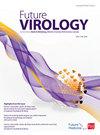Recombinant Newcastle disease virus kills liver cancer in vitro and in vivo
IF 1.4
4区 医学
Q3 VIROLOGY
引用次数: 0
Abstract
Aim: To construct and rescue a recombinant Newcastle disease virus that can express IP10 protein and evaluate its targeted killing effect on liver cancer in vivo and in vitro. Materials & methods: Fluorescence quantitative PCR, western blot and ELISA were used to detect the expression and secretion of IP10 in cells. The H22 mouse liver cancer cells were used to establish subcutaneous tumor-bearing mice experimental animal tumor models, and the tumor growth of mice in each group was observed while receiving treatment with rLasota. Results: The recombinant Newcastle disease virus was successfully constructed and can kill tumor cells successfully. Conclusion: The rLasota-IP10-IRES-EGFP achieves antitumor effects by killing hepatocellular carcinoma cells, enhancing T-lymphocyte infiltration in tumor tissues and inhibiting neovascularization.重组新城疫病毒在体外和体内杀死肝癌
目的:构建和拯救能表达IP10蛋白的重组新城疫病毒,并评价其在体内外对癌症的靶向杀伤作用。材料与方法:采用荧光定量PCR、蛋白质印迹和ELISA法检测细胞内IP10的表达和分泌。利用H22小鼠肝癌癌症细胞建立皮下荷瘤小鼠实验动物肿瘤模型,观察各组小鼠在接受rLasota治疗时的肿瘤生长情况。结果:成功构建了重组新城疫病毒,并能成功杀伤肿瘤细胞。结论:rLasota-IP10-IRES-EGFP通过杀伤肝细胞癌细胞、增强T淋巴细胞在肿瘤组织中的浸润和抑制新生血管形成而具有抗肿瘤作用。
本文章由计算机程序翻译,如有差异,请以英文原文为准。
求助全文
约1分钟内获得全文
求助全文
来源期刊

Future Virology
医学-病毒学
CiteScore
4.00
自引率
3.20%
发文量
84
审稿时长
6-12 weeks
期刊介绍:
Future Virology is a peer-reviewed journal that delivers essential information in concise, at-a-glance article formats. Key advances in the field are reported and analyzed by international experts, providing an authoritative but accessible forum for this ever-expanding area of research. It is an interdisciplinary forum for all scientists working in the field today.
 求助内容:
求助内容: 应助结果提醒方式:
应助结果提醒方式:


